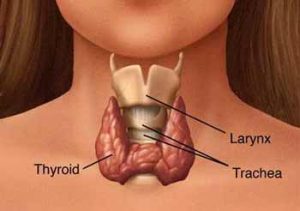The endocrine system is a network of glands that secrete hormones to regulate bodily functions. Disease and disorders of endocrine system develop when problem occurs either with the production or deliverance of hormones to different parts of the body. The blood vessels are used for the deliverance of hormones by the different glands; hence healthy blood cells are essential in the transportation. Hormonal imbalance is the result of either low or excess in production of a particular hormone. The glands of the endocrine system are responsible for the process and functions of the endocrine system such as reproduction, metabolism, growth and development. Some of the glands of the endocrine system are thyroid, pituitary, pineal, pancreas, ovaries and testes. The common disorders of the endocrine system are osteoporosis, thyroid cancer, Addison’s disease, metabolic disorder, Cushing’s syndrome, gestational diabetes, hypothyroidism, type I and type II diabetes.
Hypothyroidism
This condition develops when sufficient thyroid hormones are not produced by the gland. The thyroid hormones are needed for the healthy functioning of the metabolism. The two causes of hypothyroidism are the inflammation of thyroid gland and autoimmune thyroiditis. One is the result of insufficient hormone production and the other is the inflammation created by the immune system. Another rare cause is connected with the pituitary gland which secretes insufficient thyroid stimulating hormone responsible for signaling the thyroid gland to create hormones. Some of the associated symptoms of hypothyroidism are fatigue, weight gain, muscle cramps, memory loss, weakness, depression and abnormal menstrual cycles. Standard treatment involves regular intake of thyroid hormone to meet the hormone deficit. Treatment may require the surgical removal of part or entire thyroid gland
Addison’s disease
This is a disorder that develops when the adrenal glands are not secreting sufficient quantities of cortisol and aldosterone hormones. This can affect people of any age group and requires hormone replacement. Addison’s disease has different causes; some of the associated symptoms may include abdominal pain, low blood pressure, salt craving, depression, fatigue and nausea. The primary adrenal insufficiency is the result of damage to the outer layer of the gland (cortex) which secretes insufficient cortisol. One of the causes of primary adrenal insufficiency is an autoimmune disease. Secondary adrenal insufficiency is the deficit of adrenocorticotropin hormone (ACTH) produced by the pituitary gland. This is the signaling of the brain for adrenal glands to produce cortisol. The conditions that may hinder the production of cortisol are the loss of blood flow to the pituitary gland, pituitary tumor, severe head injury or infection. The diagnosis usually consists of the blood test to check sodium, potassium, cortisol and ACTH levels. The other tests include ACTH stimulation test and CT or MRI scans for the adrenal and pituitary gland. The treatment involves hormone replacement therapy of oral corticosteroids.



